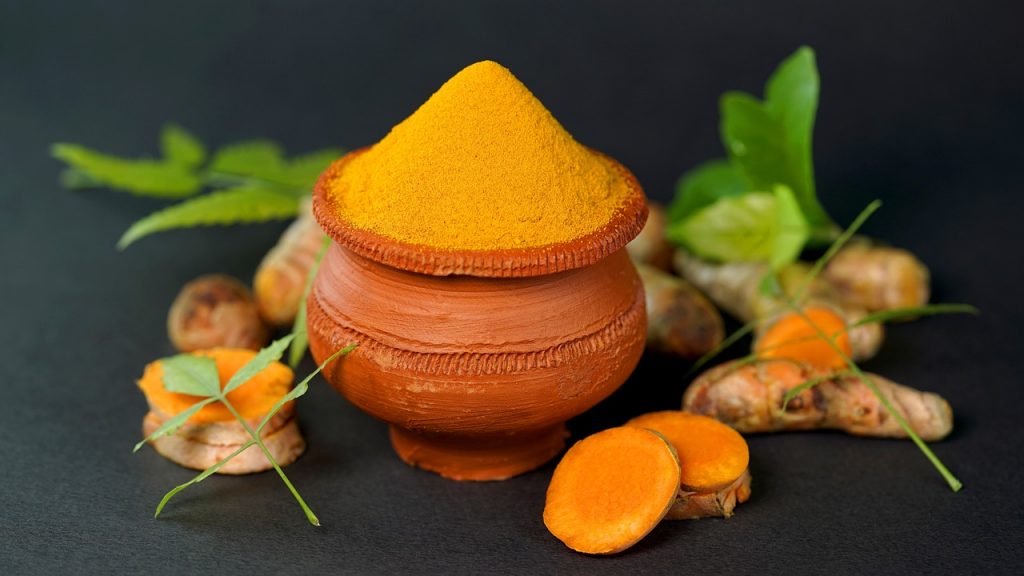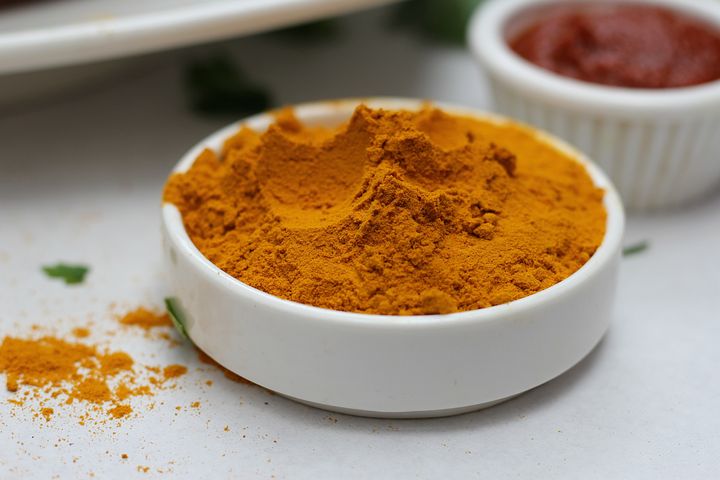Throughout history, our forefathers relied on a variety of herbs and spices not only for cooking but also for their potent medicinal properties. Few have stood the test of time as well as turmeric, arguably the most well-studied dietary supplement in modern natural medicine.

Turmeric and curcumin have become mainstays in the world of holistic healing, but what exactly is turmeric and what makes it so special?
What exactly is Turmeric?
Turmeric is a common spice derived from the Curcuma longa plant, a ginger species native to Southeast Asia. Its curcuminoids have potent anti-inflammatory and antioxidant activity, as well as a wide range of uses and benefits and very few side effects.
Turmeric root powder contains approximately 3.14% curcumin, which is known to be a significant driver of its health benefits. The best turmeric supplement, on the other hand, will contain turmeric, black pepper (piperine), and AstraGin to maximize absorption and efficacy.
So, what are the health benefits of turmeric and curcumin supplements?
Relieves Arthritis and Joint Pain
One of the most common applications of turmeric extract is to relieve joint pain and arthritis. Severe arthritic symptoms include limited range of motion, joint stiffness, excessive swelling, and lack of mobility. If left untreated, these symptoms can worsen over time, causing permanent damage.
Curcumin has been shown in studies to inhibit many of the inflammatory mediators linked to the development of rheumatoid arthritis, psoriatic arthritis, and osteoarthritis. Turmeric consistently reduces arthritis symptoms and may be an effective complementary treatment for joint pain.
Reduces Chronic Inflammation
Inflammation is the immune system’s response to irritants or threats. Inflamed areas frequently swell, turn red, or become painful. While this is a healthy and normal bodily reaction, the immune system can malfunction. Chronic inflammation can cause serious health problems.
Many studies have demonstrated curcumin’s anti-inflammatory properties by inhibiting key inflammatory markers in the body. Turmeric’s antioxidant activity also aids in the reduction of oxidative stress, a process linked to low-grade inflammation.
Cures and Relieves Back Pain
Chronic back pain is frequently the result of underlying issues such as sciatica, herniated discs, or spinal problems. While turmeric is not a direct cure for these conditions, it has shown promise in managing upper and lower back pain by targeting inflammation and reducing free radical damage.
Aids in Weight Loss
Obesity can lead to a variety of health problems, including high blood pressure, diabetes, heart disease, stroke, and others. Weight loss can be relatively simple if you are otherwise healthy. However, if you have a pre-existing metabolic disorder, things can get a little more complicated.
Several studies have shown that curcumin benefits metabolic disorders by helping to stabilize metabolism and manage weight. Turmeric improves insulin sensitivity, regulates lipid metabolism, and targets fat by suppressing multiple processes involved in the growth of adipose tissue.

Improves Skin Health
Our skin is the most important, outermost protective layer of our bodies. The skin protects us from harmful microbes and regulates our internal body temperature. Unwanted skin conditions such as chronic acne, eczema, and psoriasis can occur and require treatment.
Many DIYers use turmeric powder to make face masks, pastes, and other topical skin care solutions. Researchers have confirmed that curcumin reduces the oxidative stress associated with inflammatory skin conditions. Turmeric also boosts collagen synthesis and hastens tissue repair.
Natural Blood Thinner
Blood clots form when platelets, which are blood cells, migrate to a damaged site to plug the wound. This is a normal bodily function. Small papercuts would be fatal without clotting. Certain medical conditions necessitate blood thinning to avoid blockages.
Curcumin supplements have shown promise as an anticoagulant (blood thinner) under certain conditions. Turmeric extract influences several stages of the coagulation process, including thrombosis (local blood clotting) and hemostasis (stopping blood flow). More human trials, however, are required to confirm efficacy.
Aids in the Treatment of Disease and Chronic Conditions
One of the most significant turmeric benefits may be its powerful antioxidant properties. Curcumin has demonstrated an innate ability to boost immune system function and protect against disease by directly inhibiting free radical cell damage and reducing oxidative stress. Turmeric can help with the following:
Cancer researchers have conducted numerous trials on turmeric’s potential as a complementary treatment for cancer patients. They discovered that curcumin can selectively target cancer cells and inhibit tumour initiation and growth. Turmeric also aids in the reduction of inflammation and pain associated with chemotherapy.
Diabetes
Turmeric may be useful in lowering blood sugar levels or preventing diabetes. Several studies have shown that curcumin can help people with type 1 or type 2 diabetes. Curcumin appears to have insulin-sensitizing and glucose-lowering properties while also improving glycemic control.
High Blood Pressure (Hypertension)
One of the most common applications of turmeric is to stabilize blood pressure and prevent hypertension. It will not be able to overcome poor lifestyle choices that lead to high blood pressure. Curcumin, on the other hand, has been shown to improve vascular endothelial function, which is a blood pressure modulator that declines with age.
Alzheimer’s and Dementia
According to research, taking an oral turmeric supplement may be one of the best ways to prevent dementia and Alzheimer’s disease. Curcuminoids can help reduce beta-amyloid plaque buildup in the brain as well as neuroinflammation, two key biomarkers linked to Alzheimer’s disease development.
Controls Cholesterol
Clinical trials have concluded that turmeric can help lower triglyceride and cholesterol levels under certain conditions. Curcumin may be beneficial if you are obese, have metabolic syndrome, diabetes, or another chronic condition that affects your blood lipid profile, according to current evidence.
Candida Overgrowth
We know that the primary turmeric health benefits include antibacterial, antiviral, anti-inflammatory, and antioxidant activity. Curcumin appears to have antifungal properties, according to current research. Several studies concluded that turmeric could reduce candida overgrowth and target fungal infections with moderate success.
Irritable Bowel Syndrome (IBS)
With new research indicating that IBS patients frequently experience an increase in the body’s inflammatory response, we now have a new treatment target. Curcumin powder has shown promise in reducing IBS severity and limiting symptoms such as abdominal pain, bloating, and constipation.
Inflammatory Bowel Disease (IBD)
Ulcerative colitis and Crohn’s disease can develop as a result of ongoing inflammation in the gastrointestinal tract. Curcumin has shown significant promise in the treatment of IBD by inhibiting the upregulation of pro-inflammatory markers linked to chronic and relapsing GI tract problems.
Fibromyalgia and Chronic Fatigue Syndrome
There is currently no known cure for fibromyalgia or chronic fatigue syndrome, but there are numerous ways to manage symptoms and flare-ups. Turmeric supplements may help reduce widespread musculoskeletal pain by inhibiting inflammatory pathways and lowering oxidative stress, according to research.
Parkinson’s Disease
Parkinson’s disease is a neurodegenerative disease that affects the elderly and causes motor symptoms such as tremors, muscle rigidity, and postural instability. Curcumin has significant neuroprotective properties, aiding in the reduction of neurotoxicity and oxidative stress, both of which are associated with disease progression.
Thyroid Illness
Thyroid disease is extremely common in many populations around the world. Curcumin’s unique ability to fight inflammation, bacterial overgrowth and free radicals contribute to a healthy thyroid environment. Turmeric capsules can also help alleviate the discomfort associated with thyroid disorders.
It improves brain function.
One of the most common turmeric applications is to improve overall mental health and cognitive function. Curcumin has been shown in studies to increase DHA synthesis, which is essential for brain health. Antioxidants can also boost cognition and neuroplasticity, or the brain’s ability to form new synaptic connections.
Lowers Anxiety and Depression
Turmeric extract has been shown in several clinical trials to influence neurotransmitter balance in the brain. Curcumin appears to have antidepressant and anxiolytic properties due to its ability to modulate serotonin and dopamine levels. As a result, it may be an effective complementary treatment for depression.
Helps with Allergies and Asthma

An allergy occurs when the immune system misidentifies a foreign substance as potentially harmful to the body and overreacts to it. During an allergic reaction, we produce antibodies that respond to these allergens, resulting in a slew of unwanted symptoms (coughing, sneezing, itching, etc.).
Turmeric powder has anti-inflammatory properties
Turmeric can help fight off many allergy-related symptoms and reduce the likelihood of asthma attacks. According to current research, a curcumin supplement can reduce symptoms of sneezing, nasal congestion, and runny nose caused by restricted nasal airflow and hay fever.
Turmeric helps with Liver Detoxification
A liver detox, also known as a cleanse, involves the removal of toxins from the blood as well as the metabolization of nutrients to ensure that our bodies receive what they require. Consider the liver to be the body’s central filtration system. A healthy liver is essential for good physical and mental health.
Several studies have shown that curcumin can reduce liver damage caused by harmful substances by interrupting inflammatory pathways. Turmeric also increases bile production and release from the gallbladder, which aids in the elimination of waste from the body.
It helps with Migraines and headaches
Headaches and migraines are extremely difficult to deal with. Stress, fatigue, insufficient sleep, inflammation, poor posture, neck tension, and other factors can all contribute to excruciating pain and discomfort.
Curcumin’s anti-inflammatory and antioxidant properties have shown the most promise in treating headaches and migraines. The precise mechanisms are unknown, but turmeric appears to reduce pain associated with inflammation and directly inhibit oxidative stress in the body.
Dosage and Side Effects
How much turmeric should you take on a daily basis? The daily turmeric dosage ranges between 150 and 250 mg of curcumin. This appears to be a safe and effective dosing range for most people.
Is turmeric safe to take on a daily basis? It should be safe to consume on a daily basis as long as you stay within the recommended dosing range. Turmeric typically takes 4-8 weeks of consistent use to effectively target systemic inflammation. It may be less effective if you use it at random times. Consistency is essential.
When is the best time to take turmeric curcumin? The time of day you take curcumin is entirely up to you. You can take it during inflammatory episodes, in the morning to improve focus and mental clarity, or even before bed to reduce inflammation while you recover. It is up to the user and their objectives.
What are the disadvantages of turmeric?
Curcumin supplements are generally regarded as safe and well-tolerated by the majority of people. Turmeric side effects are uncommon and typically mild. However, there are a few potential side effects to be aware of.
- Turmeric has the potential to lower blood sugar levels. Diabetics should exercise extreme caution.
- Turmeric has anticoagulant properties and may have the ability to thin the blood.
- Excessive dosing may cause digestive discomfort in some people.
Who should avoid taking turmeric? Turmeric should be avoided by pregnant or nursing women. While it is probably safe in food quantities, it may not be safe in medicinal amounts. You should also avoid turmeric if you have scheduled surgery. Turmeric has been linked to blood clotting complications.
The distinction between curcumin and turmeric.

The turmeric root extract has been shown in nearly every study to be effective, well-tolerated at higher doses, and generally free of side effects. If you’re thinking about adding turmeric pills to your regimen, always talk to your doctor or primary care physician first. It is critical to ensure that any dietary supplement you use does not conflict with any medications you are currently taking.
Final Thoughts on Turmeric Curcumin’s Health Benefits
The answer to the question “What is turmeric good for?” is almost everything. It is critical to understand that turmeric supplements are not a cure for diseases or chronic conditions. However, curcumin’s unique medicinal properties have demonstrated significant health benefits and applications in modern natural medicine.
Disclaimer: The author’s views are his or her own. The facts and opinions in the article have been taken from various articles and commentaries available in the online media and Eastside Writers does not take any responsibility or obligation for them.
Note: Contact our Writers at www.eastsidewriters.com for writing Blogs/Articles on any niche. We have experts in various domains from Technology to Finance and from Spirituality to Lifestyle and Entertainment.
Originally posted 2022-11-13 04:49:11.







Pingback: Use Turmeric, Household Treatment, To Stay Healthy - Eastside Writers
Pingback: Do You Know the Awesome Health Benefits Of Arabinoxylans - Eastside Writers
Pingback: Cancer- Beat it with ayurveda and a strong will - Eastside Writers
Pingback: Chronic Inflammation May Be Challenging- Know The Causes & Remedy